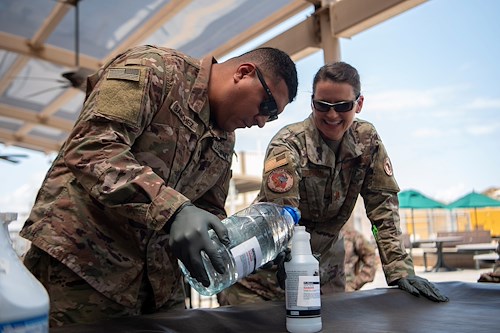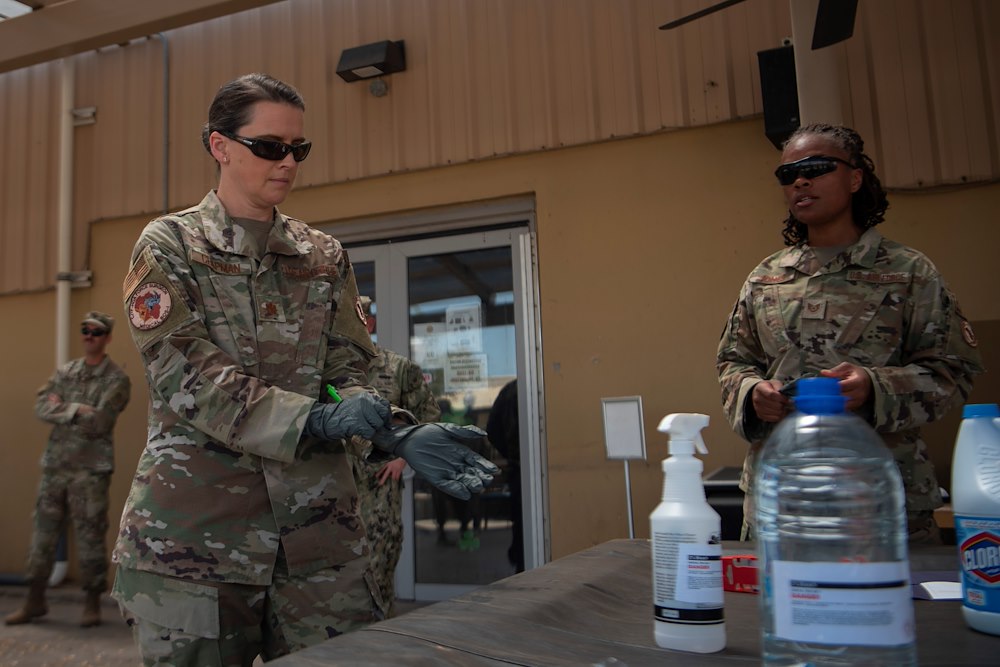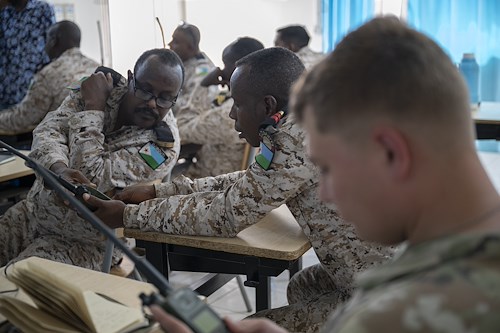Gallery contains 4 images
×
Photo 1 of 4
CJTF-HOA rolls-out Disinfectant Teams
U.S. Army Spc. Alan Sanchez, Task Force Guardian Alpha Company infantryman, pours a cleaning solution into a spray bottle during a training session for a high-traffic area disinfect team at Camp Lemonnier, Djibouti, March 27, 2020. The team learned how COVID-19 and other viruses can live on non-porous surfaces, such as metal, glass, plastic, and laminated surfaces, for several days. The teams are now disinfecting high traffic locations and objects like water filling stations, benches and doors at common use facilities frequently touched by multiple individuals to prevent illness. (U.S. Air Force photo by Senior Airman Gage Daniel)
Photo by: Senior Airman Gage Daniel
Photo 2 of 4
CJTF-HOA rolls-out Disinfectant Teams
U.S. Air Force Tech. Sgt. Pauline Jones, Combined Joint Task Force-Horn of Africa public health noncommissioned officer-in-charge, teaches service members assigned to a high-traffic area disinfectant team how to create and properly use a cleaning solution at Camp Lemonnier, Djibouti, March 27, 2020. The team learned how COVID-19 and other viruses can live on non-porous surfaces, such as metal, glass, plastic, and laminated surfaces, for several days. The teams are now disinfecting high traffic locations and objects like water filling stations, benches and doors at common use facilities frequently touched by multiple individuals to prevent illness. (U.S. Air Force photo by Senior Airman Gage Daniel)
Photo by: Senior Airman Gage Daniel
Photo 3 of 4
CJTF-HOA rolls-out Disinfectant Teams
U.S. Air Force Maj. Leah Chapman (left), Combined Joint Task Force-Horn of Africa environmental and public health officer, puts on rubber gloves before mixing bleach with water to create a cleaning solution during a training session for a high-traffic area disinfect team at Camp Lemonnier, Djibouti, March 27, 2020. The team learned how COVID-19 and other viruses can live on non-porous surfaces, such as metal, glass, plastic, and laminated surfaces, for several days. The teams are now disinfecting high traffic locations and objects like water filling stations, benches and doors at common use facilities frequently touched by multiple individuals to prevent illness. (U.S. Air Force photo by Senior Airman Gage Daniel)
Photo by: Senior Airman Gage Daniel
Photo 4 of 4
CJTF-HOA rolls-out Disinfectant Teams
U.S. Air Force Maj. Leah Chapman, Combined Joint Task Force-Horn of Africa environmental and public health officer, mixes bleach with water to create a cleaning solution during a training session for a high-traffic area disinfect team at Camp Lemonnier, Djibouti, March 27, 2020. The team learned how COVID-19 and other viruses can live on non-porous surfaces, such as metal, glass, plastic, and laminated surfaces, for several days. The teams are now disinfecting high traffic locations and objects like water filling stations, benches and doors at common use facilities frequently touched by multiple individuals to prevent illness. (U.S. Air Force photo by Senior Airman Gage Daniel)
Photo by: Senior Airman Gage Daniel
In order to keep personnel safe during the COVID-19 pandemic, Camp Lemonnier, Djibouti (CLDJ) and Combined Joint Task Force-Horn of Africa (CJTF-HOA) leadership created and trained a team of service members to disinfect high-usage areas around camp.
“The team was taught how germs, such as viruses, can live on non-porous surfaces, such as metal, glass, plastic, and laminated surfaces, for up to several days,” said. U.S. Air Force Maj. Leah Chapman, CJTF-HOA environmental and public health officer. “They were also taught the importance of cleaning and wiping down all such surfaces and objects, how to mix a bleach cleaning solution and how to apply it in the varying common use locations and the use of proper personal protective equipment for the job.”
The teams have begun disinfecting high traffic locations and objects like water filling stations, benches and doors at common use facilities frequently touched by multiple individuals to prevent illness. Areas the team will not clean include workstations, office spaces or any other location not generally used by everyone across CLDJ; those spaces remain the responsibility of the personnel assigned there, Chapman said.
“The disinfection team was formed to prevent illness,” said U.S. Air Force Tech. Sgt. Pauline Jones, CJTF-HOA public health noncommissioned officer-in-charge. “Since germs and viral disease can spread easily, CLDJ and CJTF-HOA are taking prevention practices very seriously. We are taking this measure, and many other additional steps, to keep the base clean and disinfected, to protect against the presence of COVID-19.”
Though most young healthy persons are not at a great risk of severe illness, this is not the case for everyone, Chapman said.
“If a few of us become ill, it can spread to others among us,” she said. “We must remain aware and cautious for some of our older teammates, or those who may be immunocompromised, and also remain mindful of our duty to protect our allied partners and host nations. We take our responsibility to engage in daily preventive practices very seriously.”
It is important for everyone to be educated in proper hygiene and cleanliness so the team’s, and everyone else’s, efforts are not in vain, Jones said.
“Practices such as regular hand washing and avoiding touching our noses and mouths during the day, are important measures for preventing the spread of disease,” Chapman said. “Another important habit is proper cough etiquette. This means that if you have to cough or sneeze, do so into your sleeve or elbow, but never into your hand, which can then contaminate other objects you touch.”
Jones noted it was important to remain calm and follow all posted and instructed hygiene etiquette to ensure CLDJ and CJTF-HOA can continue the mission and that all personnel are healthy and fit to fight.
“While there may be changes to our activities, we continue to maintain operational readiness, while ensuring the health and safety of personnel,” she said. The primary goal is to ensure personnel remain ready and that the ability of our service members to provide for national defense and current worldwide military missions is not hindered.”
















